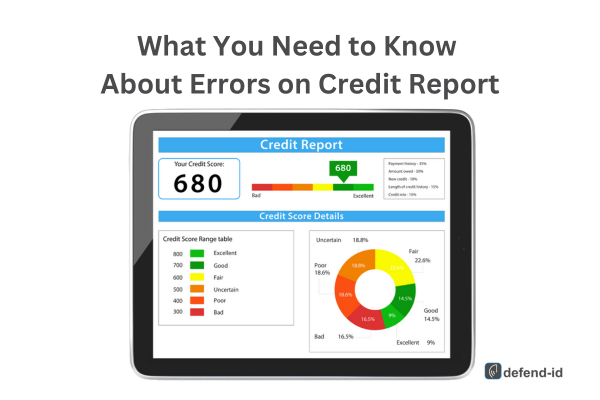Your credit report plays a crucial role in your financial well-being, and errors on it can have a significant impact. If you’re concerned about inaccuracies on your credit report, this guide will provide you with step-by-step instructions on how to identify and dispute any errors. By taking control of your credit, you can ensure that your financial information is accurate and protect your overall financial health. Continue reading to learn what you need to know about errors on your credit report.
Understand the Importance of Checking Your Credit Report Regularly.
Checking your credit report regularly is essential for maintaining good financial health. Errors in your credit report can hurt your credit score and make it harder to get loans or credit cards. By reviewing your credit report on a regular basis, you can identify any inaccuracies or fraudulent activity and take the necessary steps to correct them. Don’t wait until you’re in a financial bind to check your credit report; make it a habit to review it at least once a year to ensure its accuracy and protect your financial future.
Review Your Credit Report for Errors and Inaccuracies.
One of the most important steps in maintaining good financial health is to regularly review your credit report for errors and inaccuracies. These errors have a negative impact on your credit score. Low credit scores make it difficult for you to obtain loans or credit cards with favorable interest rates. By taking the time to review your credit report, you can identify any mistakes or fraudulent activity. Then you can take necessary steps to dispute and correct them. Don’t wait until you’re in a financial bind to check your credit report – make it a habit to review it at least once a year to ensure its accuracy and protect your financial future.
Gather Supporting Documentation to Dispute Errors.
When disputing errors on your credit report, it’s important to gather supporting documentation to strengthen your case. This documentation can include things like bank statements, payment receipts, and correspondence with creditors. By providing evidence to support your dispute, you increase your chances of having the error corrected. Keep in mind that it’s important to keep copies of all documentation for your records and to send copies, not originals, when submitting your dispute. Taking the time to gather supporting documentation can make a significant difference in the outcome of your dispute and help you take control of your credit.
Submit a Dispute to the Credit Reporting Agency.
Once you have identified an error on your credit report, the next step is to submit a dispute to the credit reporting agency. This can be done online, by mail, or by phone, depending on the agency’s preferred method. When submitting your dispute, be sure to include all relevant information, such as the specific error you are disputing and any supporting documentation you have gathered. It’s important to be clear and concise in your dispute, and providing all details needed to investigate and correct the error. The credit reporting agency must investigate your dispute within 30 days and respond. If the agency determines that the information is indeed inaccurate, they must correct it on your credit report. Take the time to submit a dispute and provide supporting documentation to take control of your credit and ensure that your credit report is accurate and up-to-date.
Follow Up and Monitor the Resolution of Your Dispute.
After submitting a dispute to the credit reporting agency, it’s important to follow up and monitor the resolution of your dispute. Keep track of the date you submitted the dispute. Make a note to follow up after the designated timeframe for investigation has passed. If you haven’t received a response within the specified timeframe, reach out to the agency to inquire about the status of your dispute. It’s also a good idea to regularly check your credit report to see if the error has been corrected. You can request a free copy of your credit report from each of the three major credit reporting agencies once a year.By staying proactive and tracking your dispute, you can ensure that inaccuracies on your credit report are addressed and corrected quickly.
Summarized
Errors on your credit report can have a significant impact on your financial well-being. By following the steps outlined in this article, you can take control of your credit and ensure that your financial information is accurate.
- Review your credit report regularly. This is the most important step in preventing errors from occurring.
- Gather supporting documentation to dispute any errors you find.
- Submit a dispute to the credit reporting agency. Be clear and concise in your dispute, and provide all relevant information.
- Follow up and monitor the resolution of your dispute. Don’t let the issue go unresolved.
By taking these steps, you can protect your financial future and ensure that your credit report is accurate.
Here are some additional tips for disputing errors on your credit report:
- Be sure to dispute the error within 30 days of discovering it.
- If you are disputing a debt, be sure to provide proof that you have paid it in full.
- Disputing an account that you do not recognize? Be sure to provide proof that you are not the account holder.
- Be persistent in following up with the credit reporting agency.
By following these tips, you can increase your chances of having your error corrected. If you have any questions on what you need to know about errors on credit report contact us here: https://www.defend-id.com/contact
Stay safe and think before you click!
Related articles:
- What is a Credit Score?
- CREDIT FREEZES vs LOCKS; WHAT YOU SHOULD KNOW
- Common errors people find on their credit report – and how to get them fixed
